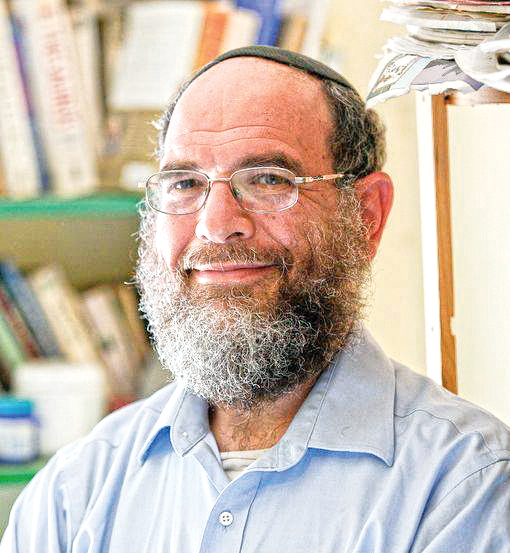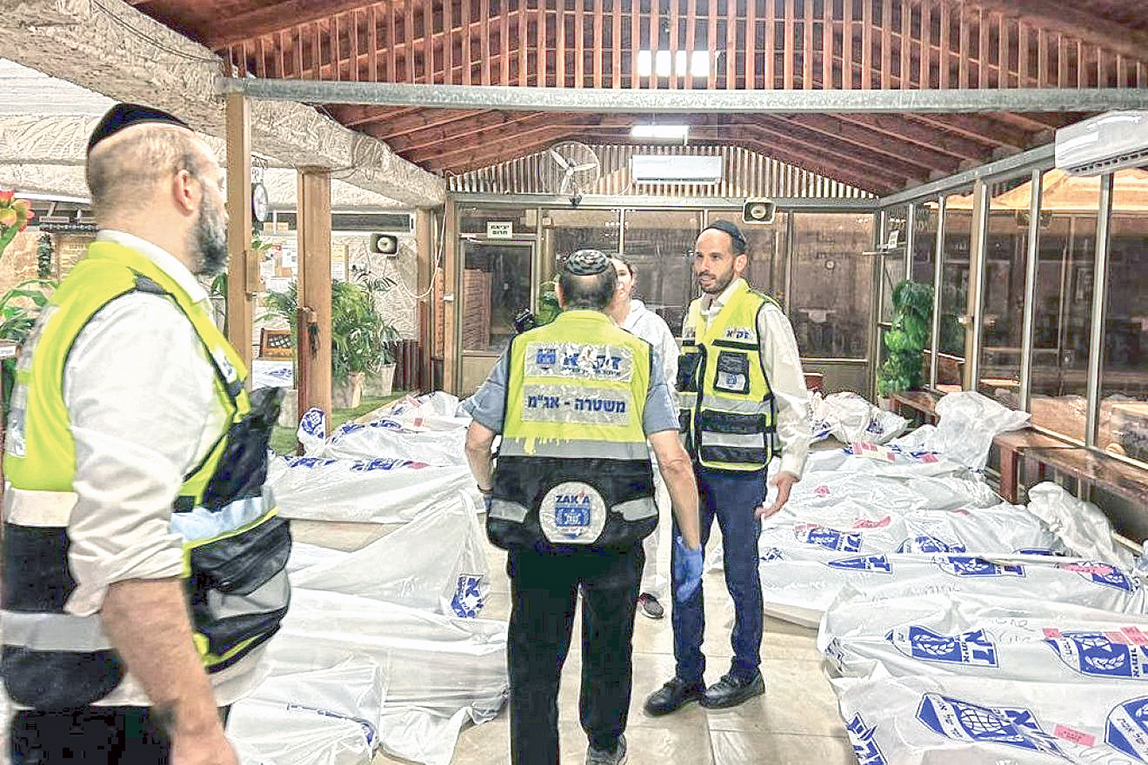‘Almost too much to bear’

Former Daytonian who has made Israel his home for 40 years opens up about the Hamas-Israel war.
By Shel Bassel
I awoke on Shabbat morning, Oct. 7 to the sound of sirens. Sirens in Jerusalem, our holiest of cities. Like nearly everyone else in the country, I had no idea what was going on but soon found out we were under unprecedented attack.
An all-clear came a few minutes later with sounds of booms nearby. It is impossible to tell if the booms come from rockets landing or from Iron Dome taking them out.
We had three more sirens that morning. After Shabbat, I was glued to the news in a way that I am unaccustomed to, watching Hebrew news channels as well as some foreign ones to take in the reaction from other parts of the world.
I cannot describe the shock I felt and continue to feel in light of the reports of horrific slaughter and taking of hostages. It was not lost on me that just a day earlier, we came out of our sukkot, the symbols of God’s protection of the Children of Israel in the wilderness, and we were attacked. Our protection was gone.
I have six children and 11 grandchildren here in Israel and my first concern was for their welfare. As of this writing on the fourth day of war, I can say they are all physically well even as we are all suffering the same mental anguish.
My son and his girlfriend, my son-in-law and many of his family members have been called up along with virtually anyone who can come for reserve duty. My concern is mainly for my son, who is now stationed in Kfar Aza near the Gaza border, a site of some of the worst horrors. I pray that he will not be sent into combat.
He was thoughtful enough to message me this morning that he is fine, he is with the best people he knows, and not to worry.
Also, he said, not to watch too much news. He is right about that. On the Hebrew channels, they interview survivors of the attack along with stories of heroism of the people who sacrificed themselves to save them. It is almost too much to bear and I have to turn away at some point.
I was a 16-year-old yeshiva student when I first came to Israel in the summer of 1973. I can recall the shock of the country on Yom Kippur that year when war broke out. But at the time I was naive about much of what was going on, unfamiliar with the politics and “the way things work” here. I experienced, though, the somber mood of the country which lasted for months. The scars from that war are still with us today.
That mood is with us again now, but it is amplified. The vast majority of the dead and captured are citizens, not soldiers in battle. The names of the dead are broadcast on television and listed at news sites. In a country Israel’s size, it is most likely that any one of us is at most one or two degrees away from someone who was murdered. It is terrible to feel relief when I don’t spot the name of someone I know personally, yet I know that each of the dead was someone’s son or daughter, wife or husband, father or mother or even grandmother or grandfather. Whole families were slaughtered together.

I am having a hard time writing this. In fact, I am having a hard time concentrating on anything at all since the outbreak of the war.
My children and grandchild in Jaffa are the closest to Gaza and have been under attack since the beginning. They hear sirens every day, if not in their immediate area, but close by. And booms that shake their windows. I am here in Jerusalem and helpless to ease their tension.
I have found myself appalled by some of the reactions I have seen to the massacre. People who blindly support Hamas as if they represent the Palestinians, and justify this merciless attack on unarmed civilians. They turn a blind eye to the utter repression that Hamas has visited on its own people, depriving them of a decent life and livelihood at the expense of arming as well as enriching themselves.
Hamas has built hundreds of miles of tunnels under the Gaza strip to hide their weapons and be able to make their way into Israel to carry out attacks against civilians; yet they have not seen fit to build bomb shelters for their own people. The opposite is the case: They use their own people, including women and children, as human shields in the hope that Israel will kill them and thus score a media and diplomatic victory.
It is now day nine of the war.
The issue of the hostages haunts the country. The loss of those who were massacred is painful enough, but knowing that nearly 200 people — including children, the elderly and the disabled are cynically being held by these evil people — is almost too much to bear.
Due to prior obligations in the U.S., I decided to leave Israel. Leaving at this time is painful. I feel as though I am abandoning my people and my country.
I had a reservation from before the war. When that flight was cancelled, I rebooked for a few days later. Also cancelled. I rebooked on another airline. When that, too, was cancelled, I took advantage of the U.S. Embassy’s offer to take us out with charter flights.
One of my daughters left with her child and husband on one of those flights Oct. 13. She is pregnant and due in December and they rightly felt it best to leave for now.
The embassy did its best although it was not well organized. They had sent me an email which I saw after Shabbat to simply come to the airport and be placed on a flight. I arrived around midnight and saw perhaps a couple hundred people lining up to get out.
After hanging around the airport for 16 hours, I was on a flight to Athens. I had just enough time to book flights from there to the U.S. with a place to stay over along the way.
I have limited my intake of news these past days but can’t keep from at least looking at headlines. I made the mistake of opening Instagram to a mix of strong pro-Israel and pro-Jewish posts and frighteningly pro-Hamas posts.
Once again, so many blame the Jews (not just Israelis!) for the attacks they have suffered. What is worse and sickening is the delight so many have in seeing Jews slaughtered.
No one I know in Israel, no Jewish person I know anywhere, delights in the death and suffering of Palestinian Arabs. But even some of my most left-wing friends, the ones actively advocating for peace with our neighbors, believe there is no choice but to destroy Hamas.
Israel will surely be vilified for the destruction that we cause in Gaza, even if all actions are justified by international law. But the general consensus is that we can no longer tolerate the status quo.
Evil exists and it has found a home with Hamas. We cannot ignore it or downplay it any longer. It is impossible to tell, though, what toll this war will take on the Jewish people and Israel in particular. Right now, the country is united in the call to wipe out Hamas. Right now, the shock, revulsion, and sadness from the massacre and the hostages keeps us together.
We don’t know yet what the toll of destroying so much to prevent future massacres will do to our psyche or our soul. Or to the soul of the soldiers who are tasked with carrying that out.
We can only pray that they are successful and that we are able to deal well with the fallout later.
Pray for peace.
Former Daytonian Shel Bassel, a Jerusalem-based sofer (ritual scribe), made aliyah (immigrated to Israel) in 1983.
To read the complete November 2023 Dayton Jewish Observer, click here.


